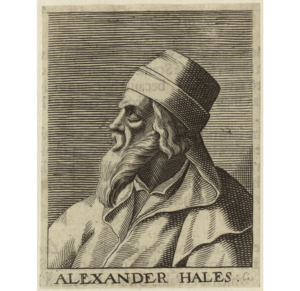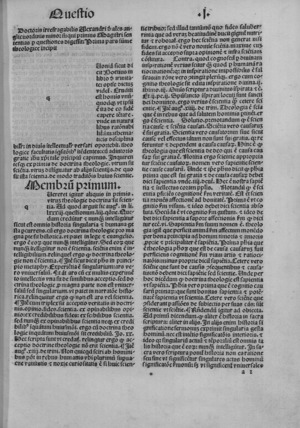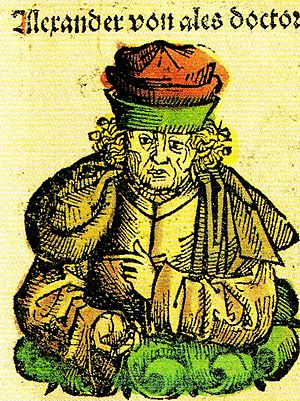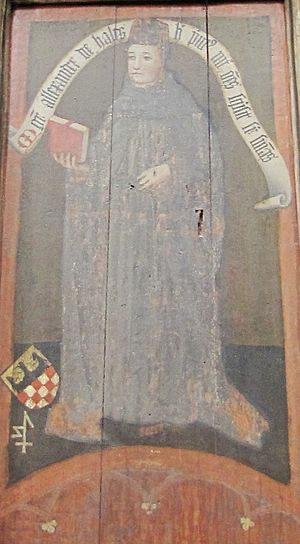Alexander of Hales facts for kids
Quick facts for kids
Alexander of Hales
OFM
|
|
|---|---|

Doctor Alexander of (H)ales by George Glover. Line engraving, mid 17th century.
|
|
| Born | c. 1185 Hales, Shropshire, England
|
| Died | 21 August 1245 Paris, France (aged 59-60)
|
| Alma mater | University of Paris |
| Era | Medieval philosophy |
| Region | Western philosophy |
| School | Scholasticism |
|
Main interests
|
Metaphysics, theology |
|
Influences
|
|
|
Influenced
|
|
Alexander of Hales (born around 1185, died August 21, 1245) was an important Franciscan friar, a theologian, and a philosopher. He played a key role in developing a way of thinking called scholasticism during the Middle Ages. People called him Doctor Irrefragibilis, which means "Irrefutable Teacher." They also called him Theologorum Monarcha, meaning "Monarch of Theologians."
Contents
Life of Alexander of Hales
Alexander was born in Hales, England, between 1180 and 1186. His family was quite wealthy. He went to the University of Paris to study. By 1210, he became a master of arts. This meant he could teach at the university.
He started studying theology (the study of religious faith) around 1212. By 1220, he became a "regent master." This meant he was a main teacher in theology. He was the first to use a book called the Sentences by Peter Lombard as a main textbook. This book became very important for theology students.
In 1229, there was a big strike at the University of Paris. Alexander helped talk to leaders in Rome about what books could be taught. He also traveled to England in 1230.
Around 1236 or 1237, when he was about 50, Alexander joined the Franciscan Order. This was a big deal because he was the first Franciscan friar to become a university professor. His ideas became the foundation for the Franciscan way of thinking about theology. He kept teaching and representing the university. He also attended an important meeting called the First Council of Lyon in 1245.
After returning to Paris, Alexander got sick. He passed his teaching position to another Franciscan, John of La Rochelle. This set a tradition for Franciscans to hold that teaching spot. Alexander died in Paris on August 21, 1245.
Because he was the first Franciscan to teach at the University of Paris, Alexander had many important students. These included Bonaventure, who looked up to Alexander as his "father and master."
Alexander's Important Works
Alexander of Hales studied and used the ideas of many other thinkers. He often referred to works by Anselm of Canterbury and Augustine of Hippo. He also quoted Bernard of Clairvaux and Richard of Saint-Victor. Alexander didn't just repeat their ideas. He added his own thoughts and conclusions. He also explained if he agreed or disagreed with them.
He was also one of the first to use the writings of Aristotle in his work. Aristotle was a famous ancient Greek philosopher. Alexander was very interested in how angels were organized, based on the ideas of Pseudo-Dionysius the Areopagite. He tried to understand their nature using Aristotle's ideas about reality.
Alexander also helped develop specific religious ideas. One was the "Treasury of merit." This idea suggests that saints and Christ built up a store of good deeds. Another idea was the "character indelibilis" (sacramental character). This means that certain religious ceremonies, like baptism, leave a permanent mark on a person's soul.
He also asked an important question: Would Christ have come to Earth if humans had never sinned? This question explored God's power and plans.
The Summa Universae Theologiae
Alexander started writing a huge book called the Summa Universae Theologiae. It was a summary and commentary on Peter Lombard's Sentences. This book was very important because it was one of the first major works of its kind.
However, Alexander died before he could finish it. Other people, mainly his students, helped complete it. Even though it was unfinished, it was a very influential book. It was full of ideas from many different sources. One scholar found thousands of quotes from Augustine of Hippo alone.
A famous thinker named Roger Bacon once joked about the Summa. He said it was "as heavy as the weight of a horse." He also thought it had many errors and showed a lack of knowledge in science and logic.
Alexander's Contribution to Learning
Alexander was one of the first scholars to use Aristotle's writings. These writings had just been translated into Latin. Between 1220 and 1227, Alexander wrote a "Gloss" (a type of commentary) on Peter Lombard's Sentences. This was a big deal because it was the first time a book other than the Bible was used as a main text for studying theology. This helped shape how scholasticism developed. It made the study of theology more organized. It also started a tradition of writing commentaries on the Sentences for future theologians.
A Medieval Scholastic Teacher
Alexander made Peter Lombard's Sentences a basic textbook. It became a framework for questions and problems that teachers could use. His "Gloss" was based on notes taken by his students during his classes. This gives us a great look into how theology was taught in the 1220s.
Alexander was also famous for his love of "disputation." This was a formal debate where scholars argued about different ideas. Before he became a Franciscan, his debates filled over 1,600 pages! He was also one of the first to take part in "Quodlibetal" events. In these events, a master had to answer any question from any student or master for three days.
A Key Theologian
When Alexander joined the Franciscan order in 1236, he was about 50 years old. He became the first Franciscan to hold a teaching position at the University of Paris. He stayed in this role until just before his death in 1245. When he became a Franciscan, he helped create a formal Franciscan school of theology in Paris.
He realized his students needed basic tools for their studies. So, he started writing the Summa theologiae, also known as the Summa fratris Alexandri. This huge book covered many topics. It discussed God, creation, sin, and how people can be saved. It also talked about religious ceremonies called sacraments. This massive book was not finished when he died. His students, William of Middleton and John of Rupella, completed it.
Alexander was a very creative theologian. He was part of a generation that started to use Aristotle's writings. Even though there was a ban on using Aristotle's works for teaching, Alexander used his ideas in his theology. He also promoted two other important thinkers: Anselm of Canterbury and Pseudo-Dionysius the Areopagite. Alexander used Anselm's ideas a lot when teaching about Christ and salvation. He used Pseudo-Dionysius when studying religious orders and church structures.
Alexander also helped advance Anselm's ideas in the 13th century. For example, he believed that original sin (the first sin of Adam and Eve) was a lack of justice. He thought it was both a punishment and a reason for more punishment. He believed that the body was corrupt, but the soul was clean. Alexander explained that God was merciful by giving the soul what it wanted (to be with the body). He was also just by punishing the soul for joining with the corrupt body.
Alexander also changed his mind about some ideas. At first, he thought God had many different ideas in His mind. But later, he decided it was more perfect for God to know just one thing. He believed that the idea of "many" things was a human idea, not a divine one.
One of his most famous works, the Summa, is important for its ideas on "just war." He listed six requirements for a war to be considered fair. These included who declares the war, the soldiers' intentions, the enemy's actions, and having a just cause. The most important reason for a just war was "peace for all."
Writings
- Alexander of Hales. Glossa in quatuor libros sententiarum Petri Lombardi. Edited by the Quaracchi Fathers. Bibliotheca Franciscana scholastica medii aevi, t. 12–15. Rome: Collegii S. Bonaventurae, 1951–1957.
- Alexander of Hales. Quaestiones disputatae antequam esset frater. Edited by the Quaracchi Fathers. Bibliotheca Franciscana scholastica medii aevi, t. 19–21. Quaracchi: Collegii S. Bonaventurae,1960.
- Alexander of Hales (attributed). Summa universis theologiae, (Summa fratris Alexandri), edited by Bernardini Klumper and the Quaracchi Fathers, 4 vols. Rome: Collegii S. Bonaventurae, 1924–1948.
See also
 In Spanish: Alejandro de Hales para niños
In Spanish: Alejandro de Hales para niños
 | John T. Biggers |
 | Thomas Blackshear |
 | Mark Bradford |
 | Beverly Buchanan |




